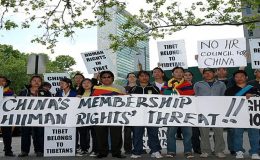UN GENEVA: CHINA DISMISSES KEY HUMAN RIGHTS RECOMMENDATIONS ON TIBET
Campaigners express shock at China’s claim to have “accepted and implemented” a call to resume dialogue on Tibet
China has rejected 62 out of 346 recommendations made during the United Nations third cycle Universal Periodic Review (UPR), calling them “inconsistent with China’s national conditions, contradictory with Chinese laws, politically biased or untruthful.” [1].
In a statement published ahead of next Thursday’s adoption session, China claims to have already implemented a number of key recommendations relating to Tibet, including – bizarrely – New Zealand’s recommendation to “resume the two-way dialogue on Tibet”. [2] In reality China suspended all formal dialogue with representatives of the Dalai Lama in January 2010. [3]
“China’s responses to the 2018 UPR recommendations beggar belief” said Dorjee Tseten of Students for a Free Tibet, speaking on behalf of the Tibet Advocacy Coalition. [4] “A significant number of the rejected recommendations simply called for cooperation with the Human Rights Council, such as allowing visits to Tibet by UN officials – recommendations that China has accepted in the past but has this time rejected as being politically motivated.”
In rejecting Denmark’s request that full access to Xinjiang and Tibet be granted for human rights experts, China responded that it “firmly opposes the practice of using the visits as an excuse to pressure the Chinese government and interfere in China’s internal affairs.” [5]
“We are shocked by China’s claim that the State has “already implemented” a recommendation to resume dialogue on Tibet when the reality is that China has not only refused to come back to the table for discussions since 2010 but has been denying that there are problems to solve in Tibet” said Migmar Dolma of Tibet Initiative Deutschland. She continued, “such false claims are clearly another proof of China’s unwillingness to change their oppressive policies against the Tibetan people.”
China also rejected recommendations from the United States and Canada on interference in religion in Tibet, saying “Religious affairs must be run in accordance with laws and regulations. The reincarnation of Living Buddhas should be consistent with religious rituals, historical conventions and China’s laws and regulations [6] and “those who break the law must be punished in accordance with law whether they are religious believers or not.” [7]
“China’s reaction to many of the recommendations [8] are a repetition of the denials and obfuscation that we have seen so often by China at the Human Rights Council“ said Mandie Mckeown of International Tibet Network. “With the scale of the crisis in Tibet, Uyghur areas and across China at a tipping point, and Beijing’s continued unwillingness to acknowledge the widespread concern, we urge UN Members States to issue a strong international response to combat the flagrant disregard for fundamental human rights, and China’s violent and systematic assault on the Tibetan people.”
Contacts:
Dorjee Tseten, Students for a Free Tibet, +1 6467533889 (English, Tibetan)
Migmar Dolma, Tibet Initiative Deutschland: +49 (0)1773366528 (English, German, French, Tibetan)
Mandie McKeown, International Tibet Network: +44 (0)7748158618 (English)
NOTES:
[1] Downloaded from https://www.ohchr.org/EN/HRBodies/UPR/Pages/CNindex.aspx. “The Chinese side has decided to accept most of the 346 recommendations, or 284 of them, covering more than 20 areas, including poverty reduction, rule of law, people’s wellbeing, counterterrorism, religion, and international cooperation. This fully demonstrates China’s determination and its active, open attitude toward promoting and protecting human rights. On the other hand, China has decided not to accept 62 of the recommendations, mainly because they are inconsistent with China’s national conditions, contradictory with Chinese laws, politically biased or untruthful.” The percentage of the overall recommendations China has accepted (82%) versus those rejected is almost identical to 2014.
[2] New Zealand Recommendation 28.318 Resume the two-way dialogue on Tibet; China replied “Accepted and already implemented.” China rejected the same recommendation in 2014.
[4] Tibet Advocacy Coalition is a project developed to coordinate strategies, monitoring tools, and reports to highlight the situation in Tibet at the United Nations Human Rights Council.
The Coalition core members are International Tibet Network Secretariat, Tibet Justice Center, Students for a Free Tibet, Tibetan Youth Association Europe and Tibet Initiative Deutschland.
[5] Denmark Recommendation 28.27 Facilitate full access to Xinjiang and Tibet for all relevant United Nations special procedures; China replied: Not Accepted. China welcomes visits to the Xinjiang Uygur Autonomous Region and the Tibet Autonomous Region by foreigners in accordance with relevant laws and regulations, but firmly opposes the practice of using the visits as an excuse to pressure the Chinese government and interfere in China’s internal affairs.
[6] United States Recommendation 28.189 Cease interference in the selection and education of religious leaders, such as Tibetan Buddhist lamas; China Replied Not Accepted. Religious affairs must be run in accordance with laws and regulations. The reincarnation of Living Buddhas should be consistent with religious rituals, historical conventions and China’s laws and regulations.
[7] Canada Recommendation 28.190 End prosecution and persecution on the basis of religion or belief, including for Muslims, Christians, Tibetan Buddhists and Falun Gong; China replied: Not Accepted. China is a country under the rule of law, and its citizens’ freedom of religious belief is protected in accordance with law. However, those who break the law must be punished in accordance with law whether they are religious believers or not.
[8] Other Tibet-specific recommendations and China’s response included:
- Australia Recommendation 28.317 Cease restrictions on the freedom of movement of Uighurs and Tibetans and allow the media and United Nations and foreign officials access to Xinjiang and Tibet; China replied: Not Accepted. The Chinese government guarantees, in accordance with law, the right to reside and travel of people of all ethnic groups, and their entry into and exit from the country. The Chinese government also ensures social order and sound port administration in accordance with laws and regulations to prevent violent terrorists at home and abroad from committing crimes.
- Switzerland Recommendation 28.320 Respect all the human rights of the Tibetan people and other minorities, including the importance of an environment that is safe, clean, healthy and sustainable, which is essential for the enjoyment of many of these rights; China replied: Accepted and already implemented.
- United States Recommendation 28.336 Cease the harassment and extraterritorial abduction of human rights defenders and their family members, cease house arrest and travel restrictions for people based on their rights defence work, and release those imprisoned for such work, including Tashi Wangchuk, Ilham Tohti, Huang Qi and Wang Quanzhang. China replied Not Accepted. China is a country under the rule of law, and all its citizens are equal in front of law. The request to release those who are under compulsory measures or serving sentences in accordance with law is an interference in China’s judicial sovereignty.
- France Recommendation 28.194 Guarantee freedom of religion or belief, including in Tibet and in Xinjiang; China replied: Accepted and already implemented.
- Germany Recommendation 28.195 Respect the rights to freedom of religion or belief, opinion and expression, peaceful assembly and culture, including for Tibetans, Uyghurs and other minorities. China replied: Accepted and already implemented.




